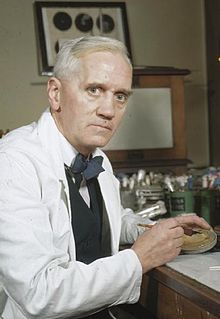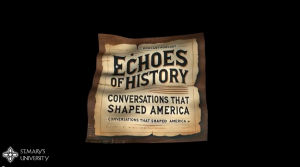People all over the world began calling it a wonder drug. Penicillin. The discovery of penicillin became a gateway for more transformative discoveries. But shockingly, to our surprise, the discovery of such a crucial drug came about from an accident in an experiment in the laboratory of Dr. Alexander Flemming in 1928.
So who was Dr. Alexander Flemming before he became famous for discovering our “wonder drug” penicillin? He was third of the four children descended from lowland farmers in Scotland. Born in 1881, Alexander’s father died when he was at the vulnerable age of seven. He began his educational enlightenment at a moorland school in a small town called Darvel in Scotland, UK.1 Here, twelve students of all ages were taught in a single classroom. Following this, he attended Darvel School, which was a four mile walk for Alexander every school day. After witnessing his potential, he was awarded a two-year scholarship to attend Kilmarnock Academy in Scotland. After those two years, Alexander moved to London where he lived with his older brother Tom. Many of his brothers similarly fled the life of farming to live with Tom. Hugh, the oldest brother, was the only one left to attend the farm.
At the age of twenty, Alexander worked in a shipping office for four years, before he inherited some money from his uncle John Flemming. It was his older brother Tom who encouraged him to follow the same career as him, a physician, and so he did. Excelling academically, it was no surprise he was awarded a scholarship to St. Mary’’s Hospital Medical School in London. Coming from little money, Fleming sought after a brighter future than the one that was waiting for him at the family farm. His decision illustrates the endless possibilities that can come from what a person chooses to make of their situation.
Alexander Flemming was a scientist beginning another one of his multiple research experiments. He was a professor at St. Mary’s hospital, and oversaw a clinic that focused on patients who suffered from boils. Because of all this, he was asked to write on staphylococci, which is a type of bacteria that causes staph infections such as skin infection and blood poisoning. It was 1928, and he began examining the various properties of staphylococcus. Towards the end of July of that year, Flemming was packed up and eager to return home on vacation. He stacked his plates on the lab bench sitting along with many other plates from previous experiments.2 There were plates that were in desperate need to be washed and cleaned up. But Flemming was known for keeping his plates an extended period of time after incubation.
When he returned from his vacation, on Monday, September 3rd, he examined the staphylococci culture plates. Keep in mind that it was unusual to leave culture plates at room temperature. As Fleming was resuming his usual course of action to be taken for such a typical day, he had remarked to Merlin Pryce, his research assistant, that there was a lot of work to be done. He began by taking the top of the culture plate from a stack of several grimy plates; they had some form of biological research left over from earlier experiments. During this time, he came across an unusual plate. Fleming’s response was, “that’s funny,” while Pryce simply brushed it off as one of the plates that helped Fleming discover lyzosome, which was a previous experiment of Fleming’s. To his surprise, the growth of staphylococcus had been diminished, and instead, the mold had grown towards one end of the plate. That is, the bacteria surrounding the mold was being destroyed. The mold had grown on one side of the plate. The shock wasn’t from the presence of mold, which would probable happen in any biological experiment. Rather, it was the complete disappearance of the cultures of staphylococcus. This told him that there was antibacterial substance in the mold that caused the disappearance of staphylococcus. So he decided to make another culture of the mold in a tube of nutrient broth. After a week of being left in the tube, the culture that was diluted about 500 to 800 times had actually inhibited the growth of staphylococci again. After much research, Fleming discovered that this mold belong to the family of penicilliium and was eventually named Penecillium Notatum.3 This was Alexander Fleming’s aha moment, the discovery of penicillin.
Just imagine conducting an experiment for your organic chemistry or biology lab; resuming your usual routine, you’ve come across a potential discovery. Fleming had no intention of achieving such a discovery. In his research he had described it as a “white fluffy mass which rapidly increases in size…cultures darken to almost black.”4 But we have Fleming and his curiosity to thank in this very moment. Just as Pryce had done in that moment, so could Fleming have chosen to ignore the plate and simply wash away the bacteria from the plate. But Fleming instead decided to explore what he saw as curious. It was this very moment that penicillin was discovered. Alexander Fleming was a very disorganized scientist. He was known for leaving his plates all over the bench and his experimental items left in the same place for days before cleaning up. Had he been a more organized scientist in his laboratory, penicillin might never have been discovered. One might say it is because of his untidiness that penicillin had been brought to discovery.5

Thus, the accidental discovery of such a drug sparked positive outcomes for the world in multiple ways. It immediately began saving the lives of hundreds of thousands of people who, prior to 1929, could not be saved with such assurance and ease from their sicknesses. Alexander Fleming was a bright scientist, but that is not to say that his discovery of penicillin was intentional. His messiness and curiosity is what allowed him to come across such a life-changing drug. On another note, discovery of penicillin was just a taste of what the medical science community has been capable of, and it sheds light on how much more there is still to be discovered. Penicillin was not the first and definitely would not be the last accomplishment for American medicine and for the world population.
- Complete Dictionary of Scientific Biography, June 2008, s.v. “Alexander Flemming,” by Charles Gillispie. ↵
- Daniel Schwarz, “The Mold that Fights for the Life of Man,” New York Times, January 2, 1944. ↵
- Daniel Schwarz, “The Mold that Fights for the Life of Man,” New York Times, January 2, 1944. ↵
- F.W.E. Diggins, “The true history of the Discovery of Penicillin, with refutation of the Misinformation in the literature,” British Journal of Biomedical Science 56, no.1 (January 1999): 85. ↵
- F.W.E Diggins, “The true history of the Discovery of Penicillin, with refutation of the Misinformation in the literature,” British Journal of Biomedical Science 56, no.1 (January 1999): 85. ↵



63 comments
Tyler Sleeter
Great article with lots of information. I was just thinking earlier today the disease is one of the few things left on the planet that can actually wipe out a large percentage of the population. Our over dependence on antibiotic everything is creating bacteria that resists almost all the known treatments. I remember reading last year about a woman that had a bacterial infection that resisted all the treatments the doctors had given her, truly a scary thought for mankind. Here is to hoping that another wonderful accident like penicillin happens again soon.
Alejandra Mendez
After reading this article, I am now more interested in not just how penicillin was first created but how other drugs were created and by who as well. It’s amazing how just ordinary people go on with their lives to create something life changing for everyone in the world like Dr. Alexander Flemming did. Had he not created “the wonder drug” who knows how some people would be treated today. It’s not just any ordinary invention. This actually changed lives.
Michael Mandujano
I commend the author for putting a great article together. I enjoyed reading and learning about the discovery of penicillin. I would also like to commend the author on providing adequate background information of Alexander Flemming, he seemed to be an interesting individual and a go-getter. Although, the “wonder drug” of penicillin was discovered by accident during an experiment, this accidental discovery turned out to be an effective medicine.
Christine Sackey
I found this article very interesting. It is amazing to think that he discovered penicillin by accident. I bet he was in awe of the discovery that he made. I find it funny that the discovery came from a lack of tidiness. The background of Alexander Flemming was nice to read. I heard about him but the background about his childhood helped me to get a better picture of what he was like. This story goes to show that sometimes accidents can be what we needed.
Erik Shannon
This article was very interesting. I never really knew the background and history of this specific medicine. I didn’t know that this medicine was accidentally discovered by Dr. Alexander Flemming by accident. Dr. Flemming was very into his education and his researches.It paid off when he was awarded the scholarship to attend Kilmarnock Academy in Scotland. This medicine is being used to this day to save the lives of many. Overall, good article.
Josselyn Arrieta-Meraz
To think that a simple messy mistake allowed for the discovery of penicillin. Alexander Flemming ‘s disorganization may have not been intentional but the fact that he further researched instead of disregarding it shows what good of a scientist he was, he was smart to be sure before he was left with the doubt. Who would’ve thought that because of this a new chain of discoveries where on the wait. This shows that we as humans are capable of anything no matter in what social standing we are in.
Matthew Rios
Great job Crystalrose, this article was great. I had never known had penicillin come to be, but I never would’ve guessed it was by an accident? It’s almost hard to believe some of mankind’s achievements were merely the result of an accident. Surely the world of medicine would be a lot different today if it wasn’t for this wonderful accident.
Samman Tyata
Great article! Your first line certainly grabbed my attention. I had no any knowledge regarding the wonder drug. You effectively provided a brief description about Dr. Alexander Flemming. Though the discovery of penicillin was accidental it played a major role in the world of medicine and for all of us. It was interesting to read that his messiness and curiosity is what allowed him to come across such a life-changing drug. To sum it up, it was a good and informative article.
Samuel Stallcup
Originally, I thought antibiotics were discovered much earlier; I did not think antibiotics were being discovered in the late 1920’s. Regardless, this article does a good job at laying out the foundation and tells a good story about how a messy scientist found a breakthrough in medical science. I enjoyed how you gave a good background to Flemming because it showed how unlikely this was to happen if not for a few things, such as him being messy and unorganized.
Amanda Figueroa
This accidental discovery of penicillin was really life changing in the world of medicine and for all of us. We are glad that someone was curious enough to continue to experiment the disappearance of the cultures of staphylococcus. This article is very well written and informative. Although I knew about this discovery, I did not know about Alexander Fleming’s life.